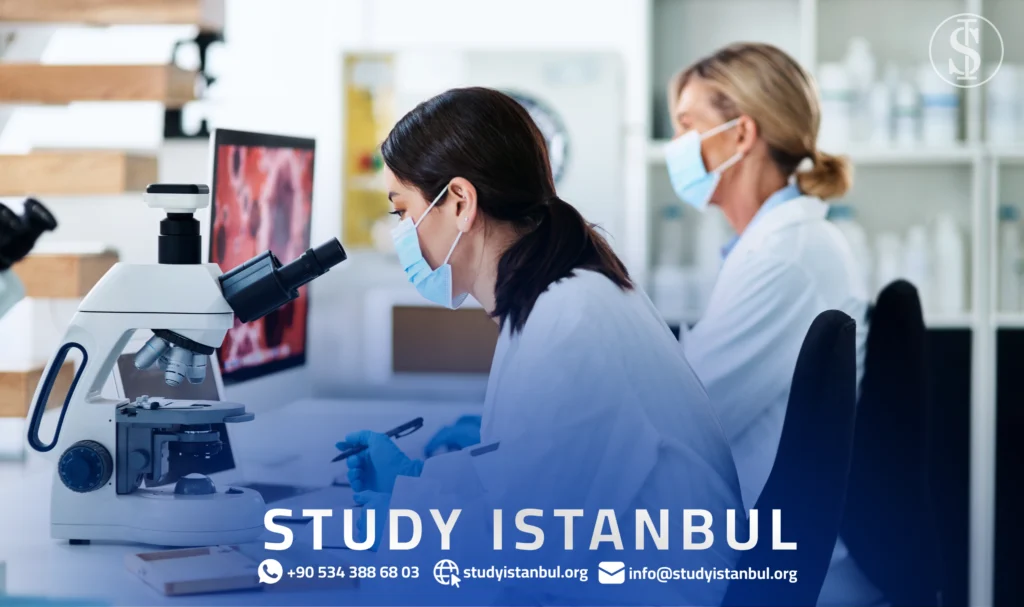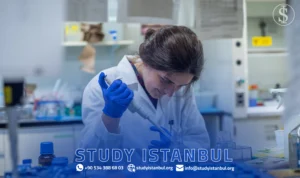Biomedical Engineering and Its Study in Turkey
Biomedical Engineering Specialization
Biomedical Engineering is a multidisciplinary field that integrates engineering and medical knowledge to develop technologies and devices that contribute to improving healthcare and treating diseases. This specialization involves the design and development of medical products such as implantable devices, surgical instruments, medical imaging systems, and software for medical applications, as well as the development of technologies for biological and medical research.
Career Opportunities in Biomedical Engineering:
- Medical Device Development: Designing and developing new medical devices, such as prosthetics, heart implants, and medical imaging systems.
- Clinical Engineering: Working directly in hospitals to manage and maintain medical equipment, ensuring its safe and effective use.
- .: Working in medical and biological research to develop new techniques for diagnosis and treatment.
- Biotechnology: Developing and producing pharmaceuticals and gene therapies using biotechnological methods.
- Diagnostic Technologies: Developing advanced diagnostic systems, such as MRI machines and X-ray devices.
- Medical and Technical Consulting: Providing consultancy to companies and medical institutions on selecting and implementing medical devices and technologies.
The difference between biomedical engineering and biological engineering primarily lies in their focus and practical applications, although both intersect in many areas and share the ultimate goal of improving healthcare through technology and engineering innovations.
Biomedical Engineering:
- Focus: Primarily focuses on applying engineering principles to medicine, such as designing and developing medical devices, diagnostic systems, and implantable devices.
- Goal: Improve healthcare by developing new technologies and tools for diagnosing and treating diseases.
Bioengineering:
- Focus: Broader in scope, encompassing engineering applications across all biological systems, not just human. It may also include work on ecosystems, genetic engineering, and industrial biology.
- Goal: Use engineering principles to understand and modify biological systems and develop biology-based technologies for various applications in medicine, agriculture, and industry.
The Goal of Studying Biomedical Engineering:
- Developing Medical Products: Creating and enhancing medical devices and equipment for diagnosing, treating, and monitoring health conditions.
- Innovation in Healthcare: Providing innovative engineering solutions to medical and biological challenges to enhance patients’ quality of life.
- Research and Development: Working in scientific research to understand biological mechanisms and develop new techniques that leverage this understanding for practical medical applications.
- Education and Training: Preparing the next generation of engineers with the skills to integrate engineering knowledge with medical and biological sciences.
Despite the overlap between these two fields, the choice of specialization depends on the individual’s personal interests and career goals. Each specialization offers diverse career paths and opportunities to contribute to improving public health and the environment.
Advantages of Studying Biomedical Engineering in Turkey:
Turkey offers a range of distinctive advantages that make it an attractive destination for international students seeking high-quality education in Biomedical Engineering. Here are some details on these advantages:
- World-Class Universities: Turkey is home to prestigious universities recognized internationally that offer specialized Biomedical Engineering programs, enhancing graduates’ competitiveness in the global job market.
- Multiple Language Options: Turkish universities offer programs in both English and Turkish, allowing students to choose the language that best suits their personal preferences and academic goals.
- High Quality of Education: Students have the opportunity to learn from experts and professionals in Biomedical Engineering, with a strong emphasis on practical training in laboratories equipped with the latest technology.
- Advanced Laboratories: Turkish universities feature scientific and technical laboratories equipped with the latest equipment, allowing students to conduct practical experiments and familiarize themselves with the most recent technologies in their field.
- Internationally Recognized Diploma: Degrees from Turkish universities are recognized in most countries around the world, opening up opportunities for graduates to work or pursue further studies internationally.
- International Learning Environment: Students benefit from a culturally diverse educational setting, interacting with peers and professors from various backgrounds, which enhances their learning experience and broadens their perspectives.
- Affordable Cost: Compared to many other countries, Turkey offers high-quality education at a reasonable cost, both for tuition fees and living expenses.
- Culture and History: Turkey is a country rich in history and culture, providing students with the opportunity to explore a rich heritage and experience a vibrant cultural life during their studies.
With these advantages, Turkey is an ideal choice for students looking to study Biomedical Engineering, as it combines academic quality with diverse cultural and professional opportunities. Studying Biomedical Engineering in Turkey offers excellent opportunities for learning and development in an advanced and progressive educational environment. Turkish universities, especially those distinguished in Biomedical Engineering, position students well to begin their careers in this vital and rapidly growing field.
Ranking of Universities in Biomedical Engineering:
- Hacettepe University: Recognized as one of the leading universities in Turkey for health sciences and engineering.
- Bahçeşehir University: Known for its international programs and focus on innovation and technology.
- Beykent University: Offers advanced programs with a focus on scientific research.
- Erciyes University: Has a long history of providing high-quality education across various scientific disciplines.
- Istanbul Medipol University: Considered one of the leading private universities in the field of Biomedical Engineering.
- Yeditepe University: Offers a strong Biomedical Engineering program with a focus on research and development.
- Yıldız Technical University: Known for its excellence in engineering and technology.
Quick Links:
- جامعة اسطنبول ايدن
- جامعة نيشان تاشي
- جامعة بيلجي
- جامعة اتيليم
- جامعة يدي تبه
- جامعة بهتشة شهير
- جامعة إسطنبول توب كابي
- جامعة التن باش
Acceptance Rate for Biomedical Engineering:
- Public Universities:Generally require an acceptance rate of at least 80%, reflecting the competitiveness and quality of Biomedical Engineering programs.
- Private Universities: May offer more flexibility in acceptance rates, providing opportunities for students with lower grades but strong passion and interest in Biomedical Engineering.
Students interested in studying Biomedical Engineering in Turkey are encouraged to contact universities directly for accurate and up-to-date information on admission requirements, tuition fees, and academic programs. This ensures they select the program that best aligns with their goals. Studying Biomedical Engineering in Turkey offers a unique opportunity to develop both academic and practical skills in a field that bridges medical and engineering sciences. With a comprehensive 4-year curriculum, students receive a well-rounded education that prepares them to tackle challenges in the field and opens up extensive career opportunities.
Biomedical Engineering Courses in Turkey:
The curriculum for Biomedical Engineering includes a wide range of courses that cover both fundamental and specialized aspects of the field, including:
- General Biology: An introduction to biology and biological processes, covering fundamental concepts such as cell structure, genetics, and physiology.
- Anatomy and Physiology: Study of the structure and functions of human organs and systems.
- Clinical Engineering: Principles of applying engineering techniques in clinical settings to manage and maintain medical equipment and ensure its effective use.
- Biophysics: Study of physical processes and principles within living organisms.
- Professional Responsibility and Ethics: Principles of ethics and professional conduct in the field of Biomedical Engineering.
- Electrical Circuits: Fundamentals of electrical circuits and systems, including principles of circuit design and analysis.
- Biomedical Devices: Design and development of medical devices, including the creation of instruments and equipment used for diagnosis, treatment, and monitoring.
- Electromagnetic Fields: Study of electromagnetic applications in medicine, including techniques like MRI and other imaging methods that utilize electromagnetic principles.
- Biostatistics: Principles of statistics applied to biological and medical data, including data analysis and interpretation for research and clinical studies.
- Biomaterials: Study of materials used in medical applications, including their properties, interactions with biological systems, and their role in implants, prosthetics, and other biomedical devices.
- معالجة الصور الطبية الحيوية: تقنيات معالجة الصور الطبية.
- أجهزة الاستشعار: تصميم وتطبيق أجهزة الاستشعار في المجال الطبي.
مجالات عمل الهندسة الطبية الحيوية:
خريجو الهندسة الطبية الحيوية لديهم فرص عمل متنوعة في:
- المستشفيات ومرافق الرعاية الصحية: إدارة وصيانة الأجهزة الطبية.
- صناعة الأجهزة الطبية: تصميم وتطوير أجهزة طبية جديدة.
- البحث العلمي والأكاديمي: العمل في الجامعات أو مراكز البحث الطبي.
- الشركات البيوتكنولوجية والصيدلانية: تطوير تقنيات جديدة وأدوية.
- المؤسسات الحكومية والهيئات التنظيمية: العمل في تقييم وتنظيم الأجهزة والمنتجات الطبية.
دراسة الهندسة الطبية الحيوية في تركيا تمنح الطلاب الأدوات والمعرفة اللازمة للمساهمة بفعالية في تقدم الرعاية الصحية وتطوير التكنولوجيا الطبية، مما يفتح لهم آفاقًا واسعة لمستقبل مهني ناجح في هذا المجال الحيوي. خريجو الهندسة الطبية الحيوية يتمتعون بفرص عمل متنوعة في مجموعة واسعة من المجالات داخل الصناعة الصحية وما وراءها. يمكنهم العمل في مؤسسات الرعاية الصحية، الشركات الخاصة بتكنولوجيا الرعاية الصحية، مراكز البحوث، والجامعات. مهامهم تتنوع من التطوير والبحث، إلى الصيانة والمبيعات، مما يوفر لهم مجموعة واسعة من المهارات التي يمكن تطبيقها في مجالات عديدة.
وظائف الهندسة الطبية الحيوية:
مهندس تطوير: يعمل على تطوير الأجهزة والتقنيات الطبية الجديدة.
- فني تكنولوجيا المعلومات: يدمج ويدير الأنظمة التكنولوجية داخل المؤسسات الصحية.
- اختصاصي المنتج: يدير دورة حياة المنتجات الطبية من التطوير إلى البيع.
- مخطط العملية: يعمل على تحسين العمليات داخل المؤسسات الصحية.
- مطور برامج: يصمم ويطور البرمجيات الخاصة بالتطبيقات الطبية.
- مهندس مراقبة الجودة: يضمن أن المنتجات والعمليات تلبي المعايير المطلوبة.
- مهندس مبيعات: يعمل على تسويق وبيع الأجهزة والمعدات الطبية.
تكلفة دراسة الهندسة الطبية الحيوية في تركيا:
تتراوح تكلفة الدراسة بين 3000 إلى 12500 دولار أمريكي سنويًا، تبعًا للجامعة وما إذا كانت حكومية أو خاصة. الجامعات الخاصة غالبًا ما تكون أكثر تكلفة من نظيرتها الحكومية.
الجامعات الأفضل لدراسة الهندسة الطبية الحيوية في تركيا:
الجامعات الخاصة:
- جامعة اسطنبول ميديبول: تقدم البرنامج باللغة الإنجليزية بتكلفة حوالي 4500 دولار.
- جامعة بهتشه شهير (BAU): باللغة الإنجليزية وبتكلفة حوالي 7900 دولار.
- جامعة يدي تبه: باللغة الإنجليزية وبتكلفة حوالي 12500 دولار.
الجامعات الحكومية:
- دراسة الهندسة الطبية الحيوية في الجامعات الحكومية في تركيا تقدم فرصًا كبيرة للطلاب الراغبين في الدخول إلى هذا المجال العلمي المتطور والحيوي.
- الجامعات التي ذكرتها توفر برامج دراسية متميزة تجمع بين الجانب النظري والتطبيقي، مما يمكّن الخريجين من مواجهة التحديات المهنية والبحثية في مجال الهندسة الطبية الحيوية.
إليك نظرة عامة على هذه الجامعات:
جامعات افيون كوجاتيبي
- تعتبر من الجامعات الناشئة في تركيا وتسعى لتقديم تعليم عالي الجودة في مجال الهندسة الطبية الحيوية، مع تركيز على البحث العلمي والابتكار.
جامعة كارابوك
- تقدم برنامجًا متكاملًا في الهندسة الطبية الحيوية يتميز بتقديم معرفة عميقة في مجال تصميم وتطوير الأجهزة الطبية، إلى جانب التطبيقات العملية والبحثية.
جامعة كوجالي
- تعد جامعة كوجالي من الجامعات الرائدة في مجال الهندسة والتكنولوجيا في تركيا، وتقدم برنامج الهندسة الطبية الحيوية الذي يجمع بين التميز الأكاديمي والتدريب العملي المتقدم.
جامعة نامق كمال
- تسعى جامعة نامق كمال لتوفير تعليم متطور في الهندسة الطبية الحيوية، مع التركيز على الأبحاث التي تلبي احتياجات القطاع الطبي وتسهم في تطوير الرعاية الصحية.
جامعة دوزجة
- تقدم جامعة دوزجة برنامجًا تعليميًا متقدمًا في الهندسة الطبية الحيوية يشمل أحدث الأبحاث والتقنيات في هذا المجال، مما يجعل خريجيها مؤهلين للعمل في مختلف مجالات الصناعة الطبية.
جامعة كاستامونو
- توفر جامعة كاستامونو بيئة تعليمية متميزة لدراسة الهندسة الطبية الحيوية، مع التأكيد على الابتكار والتطوير في مجال تصميم الأجهزة والمعدات الطبية.
الدراسات العليا في تخصص الهندسة الطبية الحيوية في تركيا :
توفر فرصًا مميزة للطلاب الراغبين في تعميق معرفتهم وتوسيع نطاق خبراتهم في هذا المجال الحيوي والمتطور. سواء كنت تختار الدراسة للحصول على درجة الماجستير أو الدكتوراه، تقدم الجامعات التركية برامج متقدمة تجمع بين البحث العلمي المتميز والتطبيق العملي، مما يؤهل الخريجين للمنافسة في سوق العمل العالمي والمساهمة في التقدم التكنولوجي والطبي.
برامج الماجستير في الهندسة الطبية الحيوية:
- جامعة كوتش: تقدم برامج باللغة الإنجليزية، مع خيار الدراسة برسالة أو بدون، وتكلفة البرنامج تصل إلى 14846 دولار.
- جامعة يدي تبه: توفر خيارات برسالة وبدون رسالة باللغة الإنجليزية، والرسوم تتراوح بين 9000 و9500 دولار.
- جامعة أنقرة ميديبول وجامعة يني يوزيل: تقدم برامجها باللغة التركية، وتتراوح التكلفة بين 4000 و4500 دولار، مع خيارات للدراسة برسالة.
برامج الدكتوراه في الهندسة الطبية الحيوية:
- جامعة أنقرة ميديبول: تقدم برنامج دكتوراه باللغة التركية مع التركيز على البحث والرسالة.
- جامعة كوتش: توفر برنامج دكتوراه باللغة الإنجليزية، متاح كمنحة بدون رسوم دراسية، مع التركيز الشديد على البحث العلمي.
- جامعة يدي تبه: تقدم برنامج دكتوراه باللغة الإنجليزية بتكلفة 10 آلاف دولار، مع التأكيد على البحث والابتكار في مجال الهندسة الطبية الحيوية.
الدراسة في هذه البرامج تعطي الطلاب الفرصة للعمل على مشاريع بحثية متقدمة، التعاون مع خبراء في المجال، واكتساب خبرة عملية في استخدام أحدث التقنيات. بالإضافة إلى ذلك، توفر الجامعات التركية بيئة دولية غنية تساعد على توسيع آفاق الطلاب وتعزيز قدراتهم التواصلية والثقافية.
الأوراق اللازمة وشروط القبول في دراسة الهندسة الطبية الحيوية في تركيا:
للطلاب الدوليين الراغبين في دراسة الهندسة الطبية الحيوية في تركيا، يتطلب الأمر الاستعداد بشكل جيد والتأكد من توفر جميع الأوراق والمستندات اللازمة للتقديم. إليكم ملخصًا للأوراق اللازمة وشروط القبول العامة:
للجامعات الحكومية:
- دبلوم المدرسة الثانوية أو ما يعادله: يجب أن تكون معترف بها في تركيا أو قابلة للتعديل.
- شهادة التخرج: من المدرسة الثانوية مع النسخ الأكاديمية.
- جواز سفر: صالح للمدة الدراسية.
- إجادة اللغة: يتطلب إثبات إجادة اللغة الإنجليزية أو التركية عبر شهادات مثل TOEFL أو IELTS للبرامج التي تدرس باللغة الإنجليزية، واختبار TÖMER للبرامج التي تدرس بالتركية.
- اختبار اليوس (YÖS): العديد من الجامعات الحكومية تتطلب اجتياز اختبار اليوس، الذي يقيس قدرات الطلاب الدوليين في مجالات مثل الرياضيات والمنطق.
للجامعات الخاصة:
- صورة جواز السفر.
- صورة شخصية.
- شهادة الثانوية العامة (البكالوريا توجيهي): مترجمة إلى الإنجليزية أو التركية ومعتمدة.
- شهادة التخرج من الثانوية العامة (إن وجدت): مترجمة ومعتمدة.
- شهادة إتمام اللغة الإنجليزية (إن وجدت): إذا كان الطالب يفضل الدراسة باللغة الإنجليزية.
- الأوراق والشهادات الإضافية: التي قد ترشح الطالب للحصول على خصومات على المصروفات الدراسية.
حقق حلمك بالدراسة في تركيا مع StudyIstanbul !
نحن هنا لنرافقك في كل خطوة من رحلتك التعليمية، مقدمين لك باقة من الخدمات الحصرية والمميزة.
- استفد من القبول الجامعي بدون تكاليف، منح دراسية جزئية، وخصومات حصرية تلبي احتياجاتك.
- استمتع بالترحيب الحار عند وصولك مع خدمة استقبال من المطار وباقات تخفيضية لتسهيل استقرارك في تركيا.
- بالإضافة إلى ذلك، استشاراتنا التعليمية الشاملة والمجانية ستضمن لك تجربة تعليمية ناجحة في تركيا.






